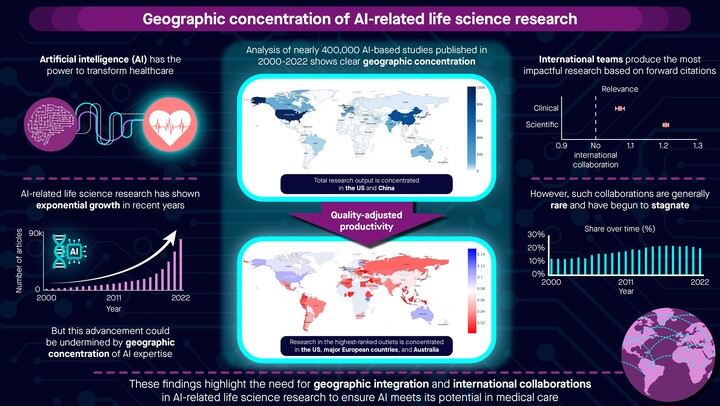Biomedical AI Research: Most Publications Come from Asia but in Terms of Quality, Other Regions Are More Convincing
Artificial intelligence is changing medicine. However, progress in biomedical AI research is unevenly distributed across the globe, a new study shows. This might hinder equitable access to health care in some regions of the world.
Press release from 17 September 2024
Print version (pdf)
While Asia has the most publications in biomedical AI research, 70 percent of high-quality publications are by North American and European researchers. Manuscripts that appear in renowned biomedical journals and are cited particularly frequently are considered to be high quality publications. These are the findings of the latest study of Professor Dr. Marc Lerchenmüller and Dr. Leo Schmallenbach, economists at the University of Mannheim. The study was published in the renowned journal Nature Communications this week. Co-author of the study is Professor Dr. Dr. Till Bärnighausen from Heidelberg University.
For their study, the researchers analyzed almost 400,000 biomedical publications from the years 2000 to 2022. Some of these relate to clinical trials conducted directly on patients with the aim of developing new drugs. Others focus on diagnostic AI applications that enable, for example, the automated reading of MRI images or the evaluation of HIV tests using a tablet – which is especially important in rural South Africa, for example.
Their analysis shows that, at 45 percent, almost half of all publications come from the US and China, with China overtaking the US in 2020. The largest proportion of high-quality research in the period under review came from the US, Australia, and some European countries. Latin America and Africa, on the other hand, account for less than two percent of these high-ranking publications.
“Artificial intelligence has the potential to change health care worldwide and democratize access to health,” says first author Schmallenbach. “However, our data points to a polarization of AI research, which could lead to this democratization not occurring at all or only after a very long delay,” Schmallenbach continues.
“We also see that the proportion of quality contributions from Europe is decreasing somewhat over time,” explains co-author Lerchenmüller, Assistant Professor of Technological Innovation and Management. “This shows that we are in a very intense competitive environment.”
Research across borders
The study also shows that international collaborations achieve more effective results than research with a national focus. They are also more likely to lead to projects with clinical applications or have an impact on follow-up studies. Regional differences are also obvious: While researchers in Asia and North America prefer to work with colleagues from the same country, Europe is more open and participates more actively in international collaborations. Africa and Latin America only participate in biomedical AI research projects to a limited extent, and could benefit in particular from international collaborations. Over the past four years, however, international collaboration has stagnated in all regions of the world and is even on the decline.
“Especially in this important and promising area of life sciences, the increasingly national research focus is a worrisome development,” says Lerchenmüller. The authors of the study are convinced that AI can better exploit its potential in medical care by taking geographical integration and international collaboration into account.
Schmallenbach, L., Bärnighausen, T., Lerchenmüller M.J. (2024). The global geography of Artificial Intelligence in life science research. Nature Communications: www.nature.com/articles/s41467-024-51714-x
A short YouTube video of this publication can be found here.
Contact:
Dr. Leo Schmallenbach
Habilitation candidate at the Chair of Organization and Innovation
University of Mannheim
Phone +49-621-181-1600
E-mail: schmallenbachuni-mannheim.de
Yvonne Kaul
Research communication
University of Mannheim
Phone: +49 621 181-1266
E-mail: kauluni-mannheim.de

